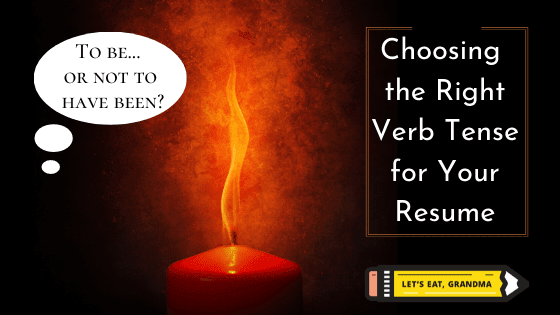Wondering whether you should write your resume in the past or present tense? Read our quick and easy guide to resume verb tense. Let us explain the nitty-gritty so you can focus on the big picture: landing your dream job.
By: Daniel Lorenzo | Marketing Manager at Let’s Eat, Grandma
To be, or not to have been? That is the question…

…if you’re writing a resume, that is. Hamlet’s question was big, but he only worried about one tense! You have a bigger question, job-seeker: should you write your resume in the past or present tense?
This is a valid question – and you’ve probably heard different answers. It makes sense to write some parts of your resume in the present tense, while some places make the past tense seem appropriate.
The best answer is much more simple than you might think, with one tricky exception. Let’s break it down:
Best Practices for Choosing a Resume Verb Tense
When to use past tense on a resume:
Write your previous professional experiences in the past tense. Old jobs, past volunteer experiences, and details of your education (if you’ve graduated) should all be written using the past tense, as they… well… happened in the past!
Example of past tense on a resume:

You can also use past tense on your resume (even in your current job) to describe previous accomplishments in your bullet points. More on this later…
When to use present tense on a resume:
Use the present tense to describe absolutely anything you’re still doing at the time of writing your resume.
Write your current job, any ongoing activities, or your education (if you’re still in school) in the present tense.
Here’s an easy trick to remember this: If you’ve written “Present” instead of an end date for an experience, use…you guessed it! The present tense.
Remember the exception:
There’s one exception to the above rules on resume verb tense: while you should write your current job in the present tense, write specific accomplishments from it in the past tense.
Your summary paragraphs for current experiences should still be in the present tense, but your accomplished-focused, metrics-bound bullet points should be in the past tense if they already happened.
This rule makes sense – the accomplishments you’re listing for your current job have already happened in the past, that’s why you can list them!
Here’s an example:

Now you know whether to use past or present verb tense on your resume and where to use each! With this knowledge under your belt, now you can focus on bigger questions to write an incredible resume. Get after it and land that dream job!
For the answer to every career development question you can think of, check out the many articles on our blog or our Career Warrior Podcast. Better yet — sign up now for a FREE phone consultation with one of our business writing experts on our homepage.


